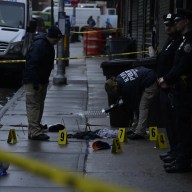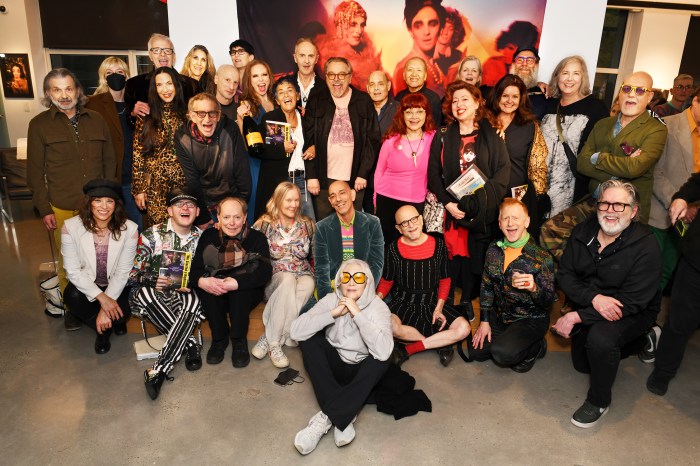By Philip Newman
Politicians, civic leaders and many of Queens’ poor and powerless last week denounced a proposed transit fare hike as a tax in disguise and predicted that closing of subway token booths would bring calamitous consequences.
Shouts of “Open the books! Open the books!” erupted often from a boisterous crowd of more than 100 people who attended the Metropolitan Transportation Authority’s Feb. 19 public hearing at Borough Hall in Kew Gardens.
Shouting and applause in agreement with speakers’ comments created a frequently tumultuous background to the hearing, one of a series required before the MTA can vote on a fare increase.
Queens Borough President Helen Marshall told the MTA that many residents use the subway as a way to cross Queens Boulevard, where 80 pedestrians have been killed by cars in recent years.
“Are our riders now going to have to choose between getting hit by a car and getting jumped by predators in empty subway stations?” Marshall asked in reference to the MTA’s plans to shut down 27 token booths in Queens.
“And at 33rd Street on the No. 7 line, where thousands of riders will disembark to see two visitors to Queens — Matisse and Picasso — you are also closing a token booth,” Marshall said. “Have you considered the impact on nearby Aviation High School and LaGuardia Community College students who attend night classes?
She also noted that at Queens Plaza, where Mayor Bloomberg has announced a major cleanup, a token booth is to be padlocked despite plans for economic development on the streets below and the Department of Corrections’ practice of dropping off prisoners from Rikers Island at 5 a.m. daily after they have been released.
Gene Russianoff, lawyer for the transit advocacy agency Straphangers Campaign, held up a fat sheaf of papers he said were thousands of e-mails protesting a fare hike.
“Where is Mr. Kalikow?” asked Russianoff in reference to MTA Chairman Peter Kalikow. “I have been to all of the MTA hearings so far and he has attended only one of them. I see only four MTA board members out of 23 here tonight. Is that a good turnout? I don’t think so.”
Many speakers asked how the MTA could even think of shutting token booths and raising the fare.
“They don’t care! They don’t care!” the crowd chanted, referring to the MTA board. Many in the audience held up signs reading: “Open Your Books,” “Pay More — Get Less” “$2 Fare — UnFair” and “Don’t Close Booths.” Some placards displayed Gov. George Pataki’s grinning likeness with the governor’s own slogan, “No Job-Killing Tax.” Transit advocates contend the fare increase is no less than a tax.
Again and again, speakers said they did not believe the MTA’s insistence that it has no choice other than to raise fares because its money shortage is so acute.
The MTA proposes to increase bus and subway fares from $1.50 to either $1.75 or $2, raise fares on the Long Island Rail Road and Metro-North commuter railroad and increase tolls on bridges and tunnels.
Many speakers said they feared the MTA would vote an increase before release of New York City and state audits of MTA finances and demanded they await the audits.
While most demanded no fare increase, U.S. Rep. Anthony Weiner (D-Forest Hills) went further, saying “I’d like you to consider a reduction in the price of a token.”
Perhaps the most impassioned speeches were delivered in reaction to the MTA’s plan to shut down 177 token booths, including 27 in Queens.
Several speakers warned that the targeted Queens stations would become a “mugger's paradise” if the MTA goes ahead with the booth closings and some suggested lawsuit settlements might offset the $25 million a year the agency says would be saved.
Darlyne Lawson of the Transport Workers Union cautioned the MTA against leaving subway stations without personnel in case of disaster.
“If another major tragedy occurs and there is nobody in the stations to help save lives, will any of you MTA members be willing to say, 'Yes, I approved this, Yes, I helped close this booth?'” Lawson said.
“The least important thing token clerks do is sell tokens,” said state Assemblywoman Toby Stavisky (D-Flushing). “Nobody will be left to see crime and report it. Like crime, fare increases happen in the shadows. Show us your books.”
Assemblywoman Cathy Nolan agreed. “The fare hike is a tax and the booth closings a service cut.”
“We cannot take a fare increase,” said City Councilman John Liu (D-Flushing), chairman of the Council’s Transportation Committee. “Not at this time.”
Jeff Diggs, an aide to City Councilman Leroy Comrie (D-St. Albans), who was ill, said he “shared the dismay” of city and state comptrollers “at not being given necessary information to determine if a fare increase is needed at this time.”
The MTA provided translators for those who spoke Cantonese, Spanish and Korean.
Nelly Falcon, who spoke through a translator in Spanish for her friend, Villoria Duque, of Long Island City.
“I want to say something for the old and the poor, many Latinos, who use the subway and bus so often,” Falcon said. “Think of us, please.”
While many speakers were older Queens residents, Beatrice Trujillo of Ridgewood was not.
“I am 12 years old and I am in the seventh grade at IS 93,” she told the MTA officials. “Many people cannot be here to defend themselves tonight. I am here to speak for them,” said the girl, who was born in Queens after her parents emigrated from Quito, Ecuador.
Reach contributing writer Philip Newman by e-mail at Timesledgr@aol.com or call 229-0300, Ext. 136.
































